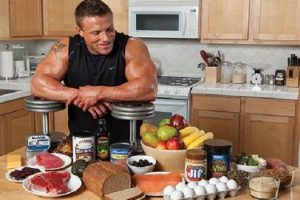When it comes to achieving your fitness goals, exercise is just one part of the equation. An equally crucial aspect is your diet. What you eat can have a profound impact on your performance during exercise, recovery afterward, and your overall health. In this comprehensive article, we will delve deep into the world of exercise diet, exploring the fundamentals, strategies, and nutritional principles that will help you optimize your workouts and enhance your well-being.
The Synergy of Exercise and Diet
Exercise and diet are not separate entities but are closely intertwined. What you eat significantly influences how you perform during workouts, recover from them, and even how effectively you achieve your fitness goals. To understand the basics of exercise diet, we need to grasp this synergy.
When you exercise, your body requires energy to fuel your muscles. The energy comes from the food you consume. Proper nutrition provides the necessary nutrients to support muscle growth, repair, and overall physical performance. An inadequate diet can lead to fatigue, decreased performance, and impaired recovery.
Macronutrients: The Building Blocks
To fuel your exercise effectively, you must understand macronutrients – the fundamental building blocks of your diet. There are three main macronutrients: carbohydrates, proteins, and fats.
- Carbohydrates: Carbs are the primary energy source for exercise. They are stored in your muscles and liver as glycogen, which your body taps into during physical activity. Incorporating the right amount of carbohydrates into your diet ensures a steady energy supply for your workouts.
- Proteins: Proteins are essential for muscle repair and growth. During exercise, especially resistance training, muscle fibers can break down. Protein intake helps in their recovery and growth.
- Fats: Fats provide a source of long-term energy. They are essential for maintaining overall health, but they are not the primary energy source during high-intensity workouts.
Balancing these macronutrients is critical, as it will depend on the type and intensity of your exercise regimen. The ratios of these macronutrients can vary between individuals and their fitness goals.
Timing Matters
Not only what you eat but also when you eat can significantly impact your exercise performance. Consider the following timing strategies to optimize your workouts:
- Pre-Workout Nutrition: Eating a well-balanced meal or snack before your workout provides your body with the necessary energy. The timing of this meal depends on your digestion rate and personal preferences. It’s generally recommended to consume a meal 1-3 hours before exercising.
- Intra-Workout Fuel: For longer or more intense workouts, you may need to refuel during the activity. This can be in the form of energy gels, sports drinks, or easily digestible snacks.
- Post-Workout Recovery: After exercising, your body is in a prime state to absorb nutrients for recovery. Consuming a combination of carbohydrates and protein within the first 30 minutes to 2 hours post-exercise can enhance recovery and muscle growth.
Hydration: The Forgotten Nutrient
While not a macronutrient, water is a critical component of your exercise diet. Dehydration can lead to reduced performance and hinder your ability to recover. Staying well-hydrated is essential, and the amount of water you need depends on factors like your activity level, temperature, and individual differences.
Electrolytes, such as sodium and potassium, also play a crucial role in maintaining fluid balance during exercise. You may need to replenish these through sports drinks or specific foods when engaging in extended or intense workouts.
Tailoring Your Diet to Your Exercise Goals
The specific diet you should follow depends on your exercise goals. Let’s look at how different objectives require tailored nutritional approaches:
- Weight Loss: If your goal is to shed excess pounds, you’ll want to create a calorie deficit. This typically involves reducing your overall calorie intake, but it’s essential to ensure that you still provide your body with the necessary nutrients for exercise.
- Muscle Building: For those aiming to gain muscle mass, a higher protein intake is crucial. A slight calorie surplus might be necessary to support muscle growth.
- Endurance Training: Endurance athletes, such as marathon runners or cyclists, require an adequate supply of carbohydrates to fuel their extended workouts.
- Overall Health and Wellness: Even if you’re not a competitive athlete, maintaining a balanced diet that covers all macronutrients is essential for general well-being.
Common Dietary Patterns
Several dietary patterns have gained popularity in the exercise and fitness communities. These include:
- High-Protein Diets: These diets emphasize protein intake to support muscle growth and reduce appetite. The Atkins and ketogenic diets are examples.
- Carbohydrate Loading: Endurance athletes often use this strategy to maximize glycogen stores in the days leading up to a race or event.
- Flexible Dieting: Also known as “If It Fits Your Macros” (IIFYM), this approach focuses on hitting specific macronutrient targets while allowing some flexibility in food choices.
- Plant-Based Diets: Vegetarian and vegan diets can provide all necessary nutrients for exercise with a focus on plant-based sources.
Special Considerations
Every individual is unique, and some may have specific dietary requirements or restrictions. Consider these special considerations:
- Food Allergies and Intolerances: If you have allergies or intolerances, it’s crucial to find suitable alternatives that still meet your nutritional needs.
- Medical Conditions: Certain medical conditions may require specific dietary modifications, so consulting a healthcare professional or registered dietitian is essential.
- Supplements: In some cases, dietary supplements like protein powder, creatine, or branched-chain amino acids may be necessary to meet your exercise goals.
- Aging and Exercise: As you age, your nutritional requirements and exercise capabilities may change. Adjusting your diet accordingly can help you maintain an active lifestyle.
Planning and Monitoring
To effectively fuel your exercise, it’s crucial to plan your diet and monitor your progress. Here are some tips to help you get started:
- Meal Planning: Create a weekly meal plan that aligns with your exercise goals and schedule.
- Food Journaling: Keeping a food diary can help you track your nutritional intake and identify areas for improvement.
- Consult a Professional: If you’re unsure about your dietary needs, consider consulting a registered dietitian or nutritionist.
- Regular Assessment: Periodically evaluate your diet and make adjustments based on your progress and changing exercise goals.
Conclusion
Understanding the basics of exercise diet is essential for anyone looking to optimize their workouts and improve their overall health. By recognizing the synergy between exercise and nutrition, mastering macronutrients, and tailoring your diet to your goals, you can achieve the results you desire. Remember, diet is not a one-size-fits-all solution, and it may take some experimentation to find what works best for you. Whatever your fitness journey, maintaining a balanced and nutritious diet will be a key factor in your success.





Add Comment